Demolition Contractors Jamesburg
Best Demo Contractor in Jamesburg
Get multiple Demolition Contractors quotes for your project today! Compare profiles, reviews, accreditations, portfolio, etc... and choose the best offer.

Torshel Tornado Shelters & Safe Rooms
53 reviewsBrick, USThe fastest way to get your storm shelter is by selecting the product or products of your interest. Then, proceed to fill out the contact form online, and a sales representative will be in touch with you. The installation time for the above and in-ground units is 1-3 weeks, depending on your location. Commercial building installation time is 3-6 weeks, depending on the size and your location. If you are building a house, make sure that you order your storm shelter ahead of time. Thank you very much, stay safe! Financing Options We’ve Been Protecting Families & Businesses For Over 9 Years Buying a storm shelter is an important decision. Torshel is committed to helping you choose the best type of shelter for both your home and budget. Both underground shelters and safe rooms offer maximum protection for storms. We encourage our clients to compare the quality of our shelters, methods of installation, and the reputation of the companies. There have been a few cases where other companies have poorly installed in-ground shelters that slip out of the ground. As a result, people can be terribly injured, and in some cases, death may occur. Some companies put profit over the lives of those who will use their products. At Torshel we work to make sure that we save and help protect as many lives as possible. We only install the highest quality storm shelters available in the market and stand behind our work by offering a 10-year warranty. We make ourselves available before and after the shelter’s installation. Commercial and Residential Storm Shelters Welcome to Torshel Storm Shelters, a leading company in the storm shelter and safe room industry. We have the best products, at an affordable price. We proudly install and serve Alabama, Arkansas, Florida, Kentucky, Louisiana, Mississippi, Tennessee, Texas, Georgia, and surrounding states. However, we sell, and ship storm shelters anywhere in the United States. We have clients in Dallas, New York, Miami, Seattle, Los Angeles, and many rural areas around the country. Enjoy your visit to our website. Take a look at our videos, pictures, and testimonials from multiple clients. We know this is an important decision. Know that if you chose us, you will get great customer service and a top-of-the-line storm shelter backed by a 10-year warranty. Torshel offers discounts to customers who purchase two or more units. Protect your family with a Torshel shelter manufactured to withstand EF5 category tornadoes. Torshel offers underground storm shelters and above-ground safe rooms of various sizes that meet or exceed FEMA’s stringent safety standards. Our tornado shelters are also more durable than traditional storm cellars. Let your neighbors, coworkers, and friends know about your purchase of your storm shelter. If they want to buy one during the same delivery and installation trip, everyone can save a lot. A case in point, Mr. Kyle told Mr. Will about his new in-ground shelter; Will liked the product and decided to purchase one. Torshel delivered and installed two units, and offered them discounts! John and George partnered installing a big shelter in-between their houses, both saved and both of their families can have direct access to the shelter. Commercial Storm Shelters The most valuable asset of any company is not its facilities, machines or products. It’s their team of employees, executives, and clients. Torshel can help protect them while at work with a commercial multipurpose storm shelter, panic room, and safe vault in the event of a tornado, hurricane, robberies, shootings, and other types of incidents that may put in danger their safety. You, your staff, and clients will have a peace of mind by having a steel safe room ready for any threating occasion. Storm Shelter in your Garage Torshel storm shelters are made of structural heavy-duty steel and are one of the bests available in the United States. Our storm shelters are well constructed and properly anchored. Such units will withstand an EF5 tornado according to engineers and professionals at Texas Tech University. They are the perfect solution for the elderly, people with disabilities, claustrophobia, and clients who want an easy to reach safe room in their garage. Inground Tornado Shelters For clients that live in mobile homes, or do not have a garage, we offer underground outdoor shelters. These underground units reflect Torshel’s latest technology. They come with a 13” x 13” bullet-resistant window made of 1.5” polycarbonate. The window allows natural light to flow inside the shelter. You won’t feel entrapped. Torshel’s Newest and High Technology Feature! 4-6 cubic yards of 3,000 PSI concrete will keep the unit inside the ground and prevent it from floating. Let’s Keep Your Family Safe The sooner the better, fill our online form and one of our talented representatives will contact you to help you with any question you might have.
- Services
- Why Us?
- Testimonials
- Gallery
Get Quote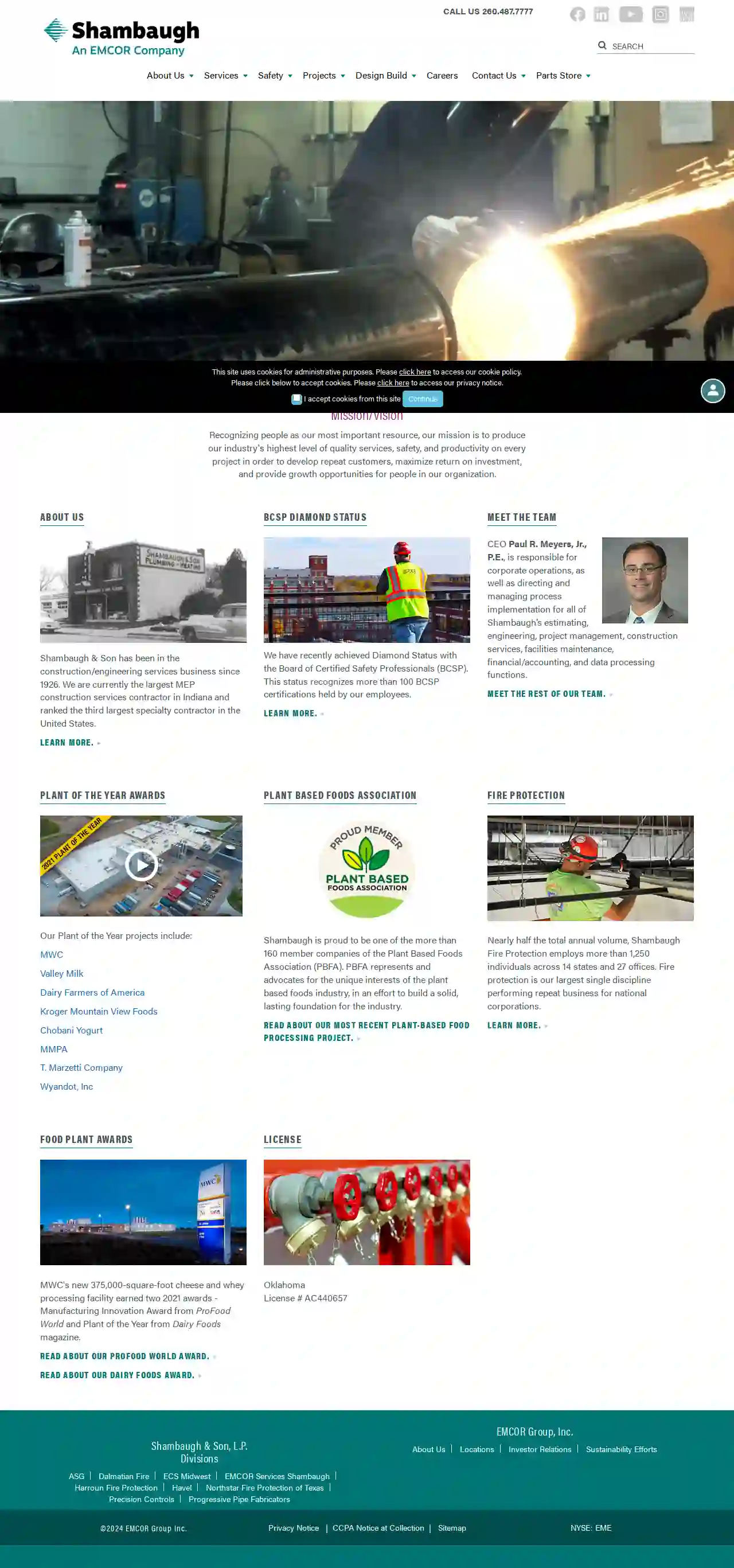
Shambaugh & Son, L.P.
4.287 reviewsWayne, USMission/Vision Recognizing people as our most important resource, our mission is to produce our industry's highest level of quality services, safety, and productivity on every project in order to develop repeat customers, maximize return on investment, and provide growth opportunities for people in our organization. About Us Shambaugh & Son has been in the construction/engineering services business since 1926. We are currently the largest MEP construction services contractor in Indiana and ranked the third largest specialty contractor in the United States. BCSP Diamond Status We have recently achieved Diamond Status with the Board of Certified Safety Professionals (BCSP). This status recognizes more than 100 BCSP certifications held by our employees. Meet the Team CEO Paul R. Meyers, Jr., P.E., is responsible for corporate operations, as well as directing and managing process implementation for all of Shambaugh’s estimating, engineering, project management, construction services, facilities maintenance, financial/accounting, and data processing functions. Plant of the Year awards Our Plant of the Year projects include: MWC Valley Milk Dairy Farmers of America Kroger Mountain View Foods Chobani Yogurt MMPA T. Marzetti Company Wyandot, Inc plant Based foods association Shambaugh is proud to be one of the more than 160 member companies of the Plant Based Foods Association (PBFA). PBFA represents and advocates for the unique interests of the plant based foods industry, in an effort to build a solid, lasting foundation for the industry. fire protection Nearly half the total annual volume, Shambaugh Fire Protection employs more than 1,250 individuals across 14 states and 27 offices. Fire protection is our largest single discipline performing repeat business for national corporations. Food Plant Awards MWC's new 375,000-square-foot cheese and whey processing facility earned two 2021 awards - Manufacturing Innovation Award from ProFood World and Plant of the Year from Dairy Foods magazine. LICENSE Oklahoma License # AC440657 Shambaugh & Son, L.P. Divisions ASG Dalmatian Fire ECS Midwest EMCOR Services Shambaugh Harroun Fire Protection Havel Northstar Fire Protection of Texas Precision Controls Progressive Pipe Fabricators EMCOR Group, Inc.
- Services
- Why Us?
- Our Team
- Gallery
Get Quote
Del Casale Excavating
511 reviews1000 County Route 106, Clifton Park, 12180, USDel Casale Excavating: Your Trusted Partner for Excavation Services Del Casale Excavating is a family-owned and operated business with over 20 years of experience in the excavation industry. We are committed to providing our clients with high-quality, reliable, and affordable services. Our team of experienced professionals is dedicated to exceeding your expectations and delivering exceptional results. We understand that every project is unique, and we take the time to listen to your needs and develop a customized plan that meets your specific requirements. Whether you need site preparation, foundation excavation, utility installation, or any other excavation service, we have the expertise and equipment to handle the job efficiently and effectively. At Del Casale Excavating, we are committed to safety and environmental responsibility. We use the latest technology and equipment to minimize our impact on the environment and ensure the safety of our workers and the public. Contact us today for a free consultation and let us help you bring your project to life.
- Services
- Why Us?
Get Quote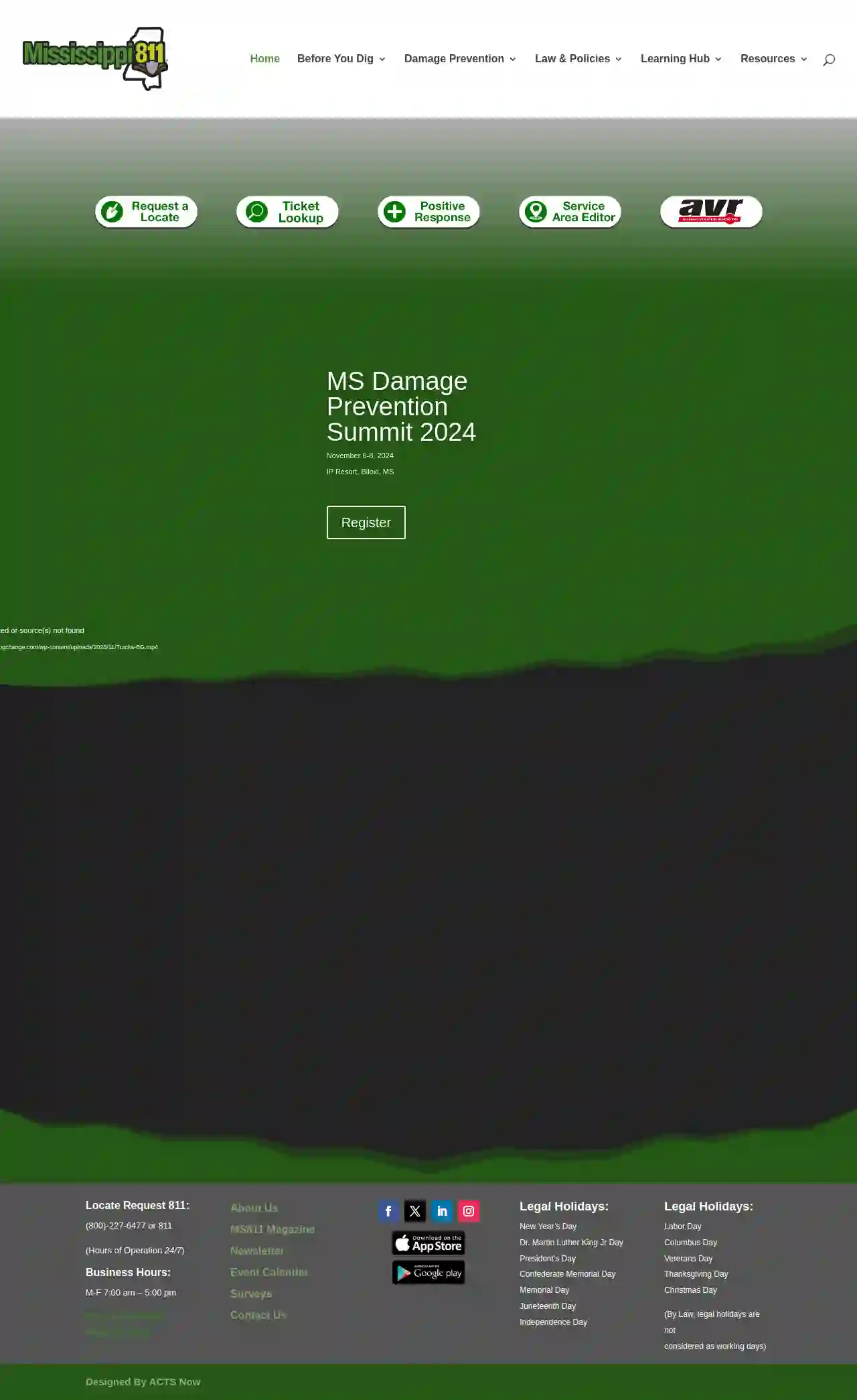
Mississippi 811, Inc.
4.823 reviews200 Country Pl Pkwy, Pearl, 39208, USAbout MS811 MS811 is a vital resource for anyone planning to dig in Mississippi. Our mission is to protect underground infrastructure and ensure the safety of excavators, homeowners, and the public. We provide a free, easy-to-use service that helps you locate underground utilities before you dig. By calling 811 or visiting our website, you can request a locate request and ensure that you are digging safely. We are committed to providing our customers with the highest level of service and support. Our team of experts is available 24/7 to answer your questions and help you navigate the process of digging safely. We also offer a variety of resources and information to help you understand the importance of damage prevention and the laws and regulations that govern excavation in Mississippi. We believe that everyone has a role to play in protecting underground infrastructure. By working together, we can prevent damage to utilities and ensure the safety of our communities.
- Services
- Why Us?
- Gallery
Get Quote
Tractor Solutions, LLC
Wayne, USGet More Work Done... Tractor Solutions, LLC is a skilled landscape excavating contractor dedicated to providing high-quality services and exceeding client expectations. We understand the importance of efficiency and effectiveness in your projects, and we strive to deliver results that meet your specific needs.
- Services
- Why Us?
- Gallery
Get Quote
Fox Contractors Corp
4.618 reviews5430 W. Ferguson Road, Fort Wayne, 46809, USWe can dig it. To get a job done right, you need to start with someone who really knows what they’re doing. That’s Fox Contractors. Decades of laying the groundwork Since 1948, we’ve been behind projects in and around Indiana that require specialized support with earthmoving and underground utilities. Our expertise can be found on jobs that range from heavy highway and public works to commercial and industrial site development. View Our Certifications Minority Business Enterprise Indiana Veteran Owned Small Business Enterprise Veteran Owned Business After more than 70 years in business, we’ve built a reputation for impeccable work that’s done on time and on budget. That, along with our fair pricing and highly skilled, safety-conscious workforce make us the first choice for project managers who are looking for a reliable partner. Our clients include DOTs, municipalities, general contractors and developers, and we have experience in the healthcare, education and environmental fields. Fox Contractors is proud to be a certified Minority Business Enterprise (MBE) and a 100% signatory contractor with the IUOE, Teamsters and Laborers’ unions. With a headquarters in Fort Wayne and a regional office near Indianapolis, Fox Contractors serves customers across the region and is prequalified with the Indiana, Michigan and Ohio Departments of Transportation. We take care of business – from the ground up. ”Fox places a high value on safety because our people are our #1 asset. We strive to minimize or eliminate hazards all together, so that all employees can work in a safe environment, without losing time. Our safety-first approach is reflected in our extensive training and education, as well as an employee safety commitment that starts from the top down.” Dallas Day, Owner, Fox Contractors Corp.
- Services
- Why Us?
- Testimonials
- Gallery
Get Quote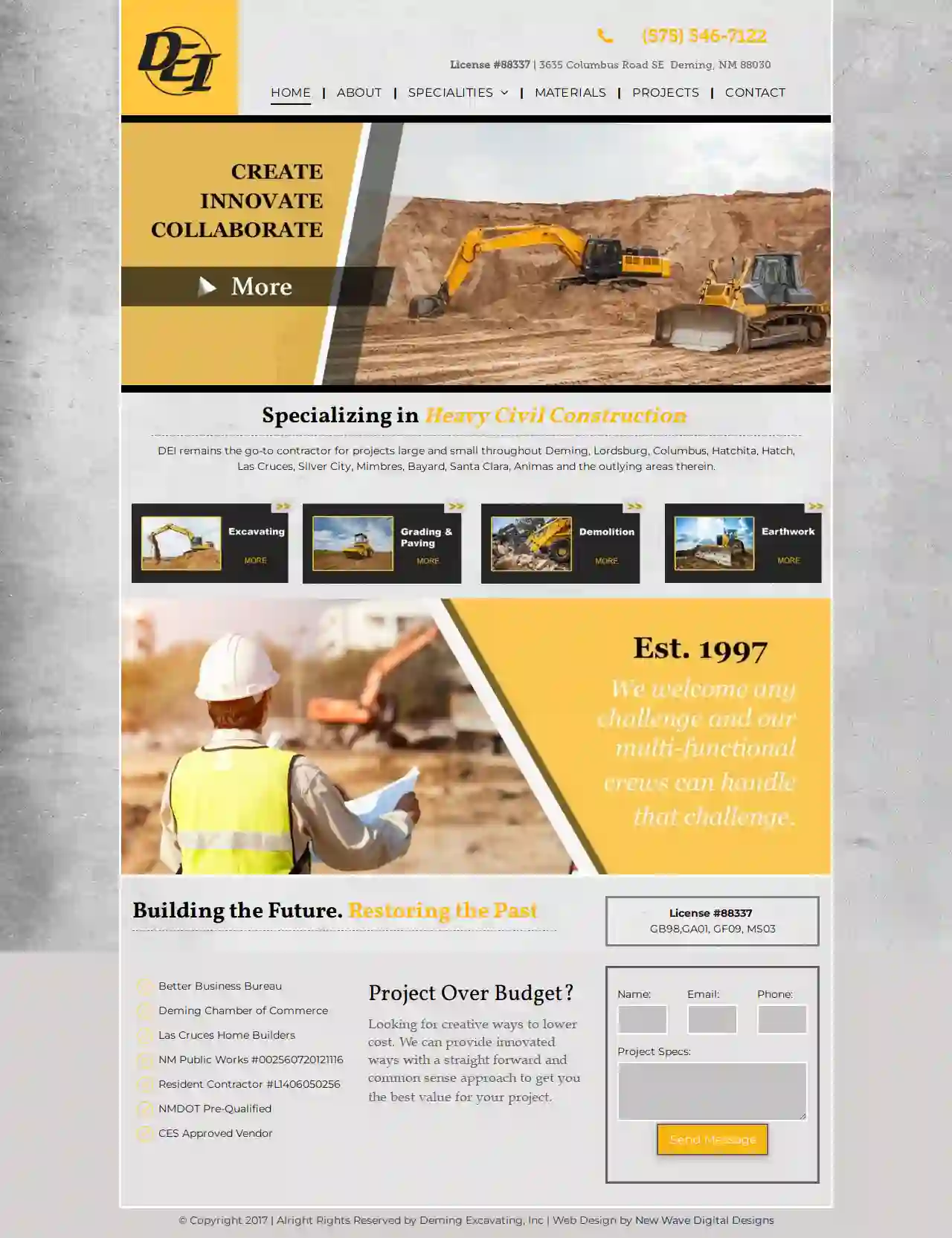
Deming Excavating, Inc.
4.712 reviews3635 Columbus Road SE, 3635 Columbus Rd SE, Deming, 88030, USAbout Deming Excavation, INC. Specializing in Heavy Civil Construction, our multi-faceted experience includes demolition, hauling, earthwork, mass grading, fine grading, wet utilities, asphalt paving, rehabilitation and maintenance, and concrete. We are a complete site development contractor. Our skilled management team is familiar in dealing with private and public agencies. We are prepared to deliver fast, professional, and on-budget services to each and every one of our clients. We believe our commitment to our customers and our work is what sets us apart and makes us the top choice in Southern, New Mexico. Building the Future. Restoring the Past Project Over Budget? Looking for creative ways to lower cost. We can provide innovated ways with a straight forward and common sense approach to get you the best value for your project.
- Services
- Why Us?
- Gallery
Get Quote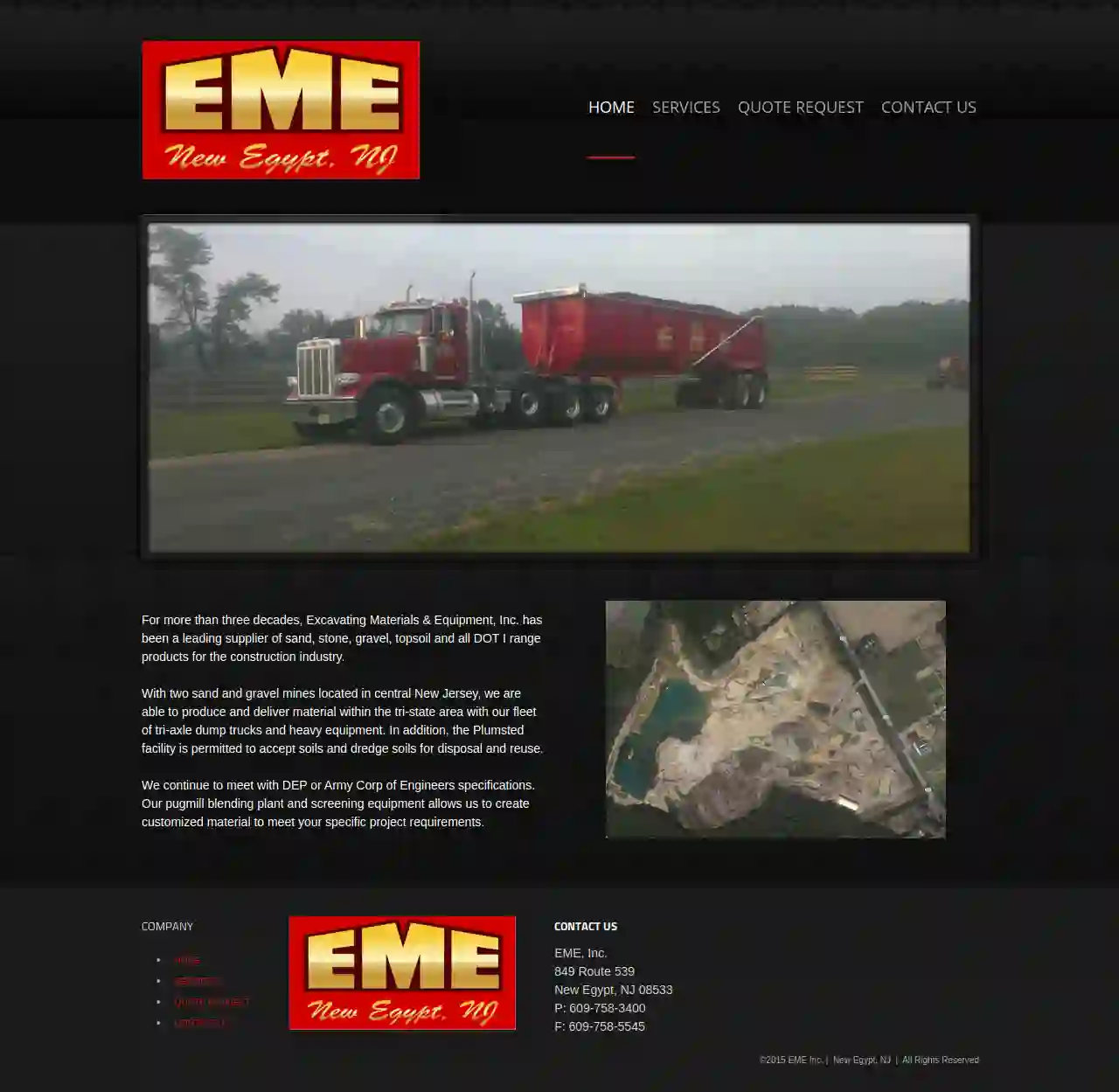
Excavating Materials & Equipment, Inc.
37 reviews849 Route 539, New Egypt, 08533, USExcavating Materials & Equipment, Inc. (EME) For over three decades, EME has been a leading supplier of sand, stone, gravel, topsoil, and DOT I range products for the construction industry in central New Jersey. We operate two sand and gravel mines, ensuring we can efficiently produce and deliver materials within the tri-state area using our fleet of tri-axle dump trucks and heavy equipment. Our commitment to quality extends beyond material supply. The Plumsted facility is permitted to accept soils and dredge soils for disposal and reuse, adhering to strict DEP and Army Corp of Engineers specifications. Our pugmill blending plant and screening equipment allow us to create customized materials tailored to your specific project requirements.
- Services
- Why Us?
- Gallery
Get Quote
Jordan Construction, Inc.
539 reviewsPO Box 6242, Vancleave, 39565, USThe Dream Can Be Yours Inground pools are the height of luxury for any homeowner. Adding increased buyer appeal and fun for residents, spas and swimming pools are great features for any client to consider. Just imagine this. Hearing the tranquil sound of water just beyond your door and seeing the gleam of crystal waters in your very own pool? Sound appealing? The dream can be yours. As a licensed construction company, Jordan Construction specializes in installing luxurious swimming pools and spas second to none. Partnered with providers that include Thursday Pools and Imagine Pools, we work hard to transform your outdoor living space into an exotic oasis complete with concrete patio surrounds and an inground pool that will be the envy of the neighborhood! Seeking to incorporate other outdoor enhancements for your home? We can help with driveways, patios, custom decks and much more! Have you always longed for a pool? Part of the benefit of choosing Jordan Construction, Inc. is that we bring years of experience to the field. Through our countless projects we've taken on, we've cultivated our craft to the highest level of precision. We understand that when you hire our team to install a pool, you are seeking a luxurious result and that's exactly what we deliver. Don't believe us? Just take a look at our reviews from happy clients. Our goal is to not only meet your expectations, but exceed them! What Customers Are Saying... Very highly recommend Jordan Construction! If you are considering installing a pool, you will not find better on the coast than Eddie! He and Kelly will explain every step, cover all the options and ensure you are comfortable with the process. We didn't pay a dollar more than expected, and they were done in exactly 2 weeks as planned. Eddie and his crew are thoughtful, careful and quick! Now we just need some warm weather to heat up our awesome new pool!! -Jennifer Johnson Williams More than pools As we've stated before, we're a full-service construction company that offers more than pool installation. Our custom concrete services entail not only laying grounds for pool installs but we also lay driveways, patios, and even home foundations. Need a new deck? We're on it! Our Office is your Backyard If you live in... MISSISSIPPI: Vancleave, Bay Saint Louis, Biloxi, Diamondhead, D'Iberville, Gautier, Gulfport, Hattiesburg, Long Beach, Moss Point, Ocean Springs, Pascagoula, Wiggins & Picayune
- Services
- Why Us?
- Testimonials
- Gallery
Get Quote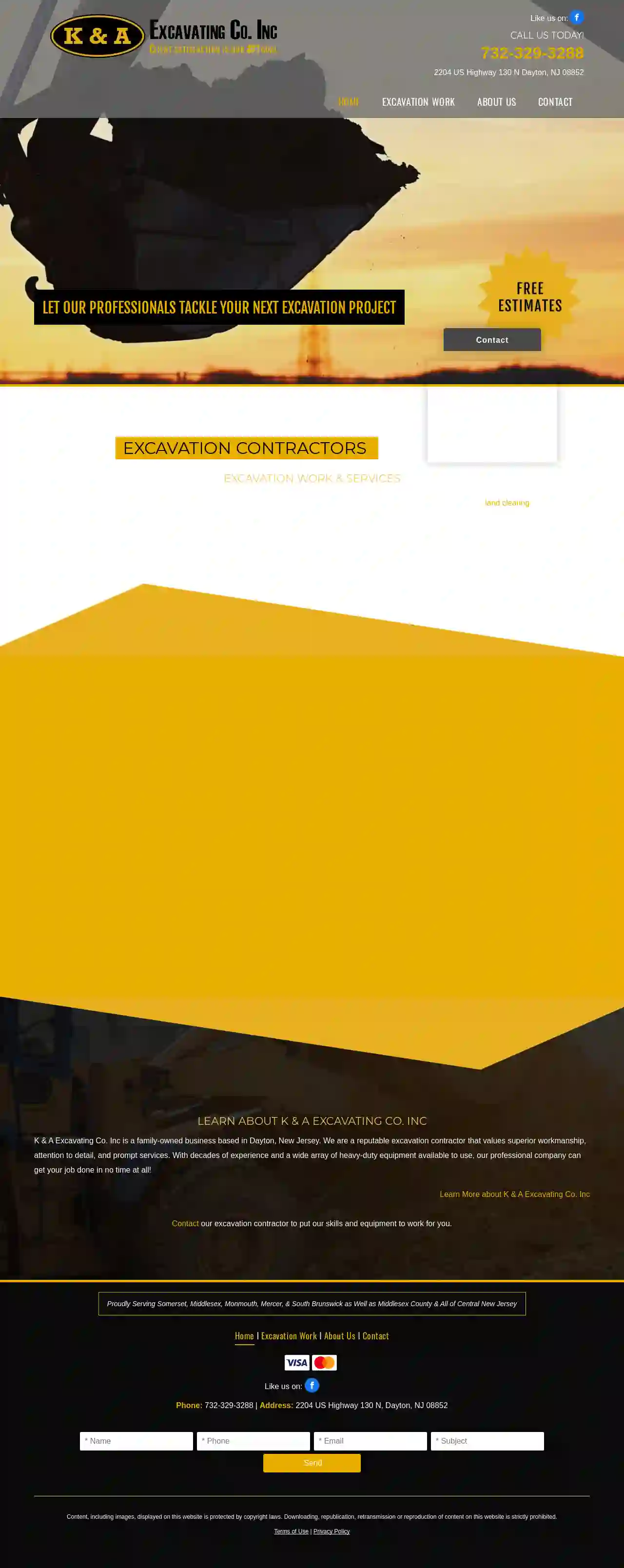
K & A Excavating Co Inc.
4.522 reviews2204 US Highway 130 N, Dayton, 08852, USAbout K & A Excavating Co. Inc K & A Excavating Co. Inc is a family-owned business based in Dayton, New Jersey. We are a reputable excavation contractor that values superior workmanship, attention to detail, and prompt services. With decades of experience and a wide array of heavy-duty equipment available to use, our professional company can get your job done in no time at all! At K & A Excavating Co. Inc, we have built our reputation on our commitment to providing quality service, which has earned us many valuable customers. With more than 30 years of experience, we are the go-to company for customers when they're in need of asphalt removal, land clearing, or site preparation. Our company uses only the best equipment for each job. In addition, we maintain a skilled staff to perform all projects. They are more than happy to answer any of your questions regarding our services. K & A Excavating Co. Inc's mission is to provide customers with courteous and friendly service and quality workmanship. Request a free estimate from us today for your project!
- Services
- Why Us?
- Gallery
Get Quote
Over 22,076+ Excavation Companies on our directory
Our excavation companies operate in Jamesburg & surroundings!
ExcavationHQ has curated and vetted Top Excavation Contractors in and around Jamesburg. Find a reliable business today.
Frequently Asked Questions About Demolition Contractors
- Site Security: Secure the demolition site with fencing and warning signs to prevent unauthorized access.
- Personal Protective Equipment (PPE): Workers should wear appropriate PPE, including hard hats, safety glasses, gloves, and steel-toe boots.
- Hazardous Material Removal: Properly identify and remove asbestos, lead paint, or other hazardous materials before demolition begins.
- Utility Disconnections: Disconnect all utilities, such as electricity, gas, and water, before demolition.
- Controlled Demolition Techniques: Employ controlled demolition methods to minimize risks and ensure the structure comes down safely.
- Dust Control: Implement dust suppression measures, such as water spraying or misting, to reduce airborne particles and protect air quality.
- Emergency Planning: Have an emergency plan in place, including communication protocols and evacuation procedures, in case of unforeseen events.
- Dust Suppression: Use water spraying, misting systems, or other dust suppression techniques to control airborne particles.
- Noise Barriers: Erect temporary noise barriers around the demolition site to reduce noise transmission to nearby properties.
- Work Schedule: Schedule noisy demolition activities during permitted hours to minimize disturbance to neighbors.
- Communication: Keep neighbors informed about the demolition schedule and any potential disruptions.
What are the safety precautions for demolition?
Do I need a permit for demolition?
How can I tell if my building contains asbestos?
How can I minimize the dust and noise from demolition?
What are the safety precautions for demolition?
- Site Security: Secure the demolition site with fencing and warning signs to prevent unauthorized access.
- Personal Protective Equipment (PPE): Workers should wear appropriate PPE, including hard hats, safety glasses, gloves, and steel-toe boots.
- Hazardous Material Removal: Properly identify and remove asbestos, lead paint, or other hazardous materials before demolition begins.
- Utility Disconnections: Disconnect all utilities, such as electricity, gas, and water, before demolition.
- Controlled Demolition Techniques: Employ controlled demolition methods to minimize risks and ensure the structure comes down safely.
- Dust Control: Implement dust suppression measures, such as water spraying or misting, to reduce airborne particles and protect air quality.
- Emergency Planning: Have an emergency plan in place, including communication protocols and evacuation procedures, in case of unforeseen events.
Do I need a permit for demolition?
How can I tell if my building contains asbestos?
How can I minimize the dust and noise from demolition?
- Dust Suppression: Use water spraying, misting systems, or other dust suppression techniques to control airborne particles.
- Noise Barriers: Erect temporary noise barriers around the demolition site to reduce noise transmission to nearby properties.
- Work Schedule: Schedule noisy demolition activities during permitted hours to minimize disturbance to neighbors.
- Communication: Keep neighbors informed about the demolition schedule and any potential disruptions.